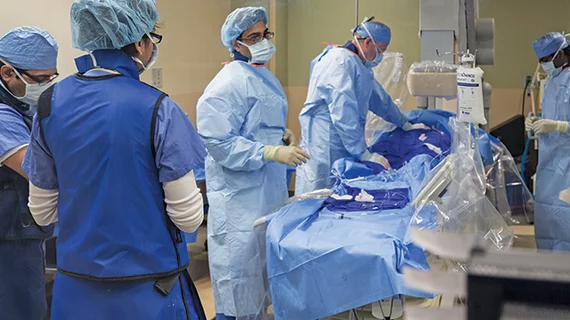High-salary medical specialists are in higher demand than primary care physicians
More hospitals and healthcare providers are seeking medical specialists compared to primary care physicians––and many of these roles comes with the highest starting salaries in the industry.
The industry trends, including demand and the highest starting salaries among specialists were outlined in Merritt Hawkins’ annual report, the 2019 Review of Physician and Advanced Practitioner Recruiting Incentives report, which tracked a sample of 3,131 physician and advanced practitioner recruiting engagements conducted by Merritt Hawkins from April 2018 to March 2019.
Among the physicians tracked in the 2019 report, invasive cardiologists had the highest average starting salaries, at $648,000, followed by orthopedic surgeons, who earned an average of $536,000. By comparison, noninvasive cardiologists earn $441,00 on average. Gastroenterologists averaged $495,000 and urologists averaged $464,000. Physicians saw an average signing bonus of $32,692.
While family physicians were the most requested recruiting assignment in the report, average starting salaries were on the lower end, at $239,000.
Psychiatrists were the second most requested recruiting assignment, reflecting a significant need for these professionals. In fact, Merritt Hawkins found a “severe shortage” of psychiatrists and mental health professionals.
“The shortage of medical specialists flies under the radar, but it is a serious public health concern that deserves more attention,” Travis Singleton, executive vice president of Merritt Hawkins, said in a statement.
Overall, demand for specialists outpaced primary care, highlighting where other shortages are expected. According to the report, 78% of recruiting engagements by Merritt Hawkins were for medical specialists in the last year, compared to 67% four years ago. At the same time, searchers for primary care physicians, including family doctors, internists and pediatricians, dropped 8% year-over-year, and whopping 38% from four years ago.
“While demand remains strong for primary care physicians, specialists are increasingly needed to care for an older and sicker population,” Singleton said. “In some medical specialties, shortages are emerging that will pose a serious challenge to public health.”
A recent projection from the Association of American Medical Colleges (AAMC) outs the shortage of primary care physicians at 55,2000 by 2030 and a shortage of 67,000 for specialists. The states most likely to face a physician shortage include Wyoming, Montana, Mississippi, Oklahoma and Arkansas, according to the report.
Several factors are impacting the anticipated physician shortage, including an aging workforce, limited funding for physician training and changing physician patterns, the report found. In addition, a rapidly aging population is accelerating the need for more doctors.
“Seniors will soon represent a considerably higher percent of the population than they do today,” the report reads.
As demand grows, so too does the need for primary care physicians in value-based care delivery models in particular, where primary care-led teams are at the bleeding edge of population health and care coordination.
“Primary care physicians such as family physicians top the list of most in-demand doctors in part because of their key role as ‘quarterbacks’ of the delivery team,” the report found.
While the demand for PCPs remains, medical specialists are more actively being recruited in anticipation of severe shortages down the line, the report concluded.

